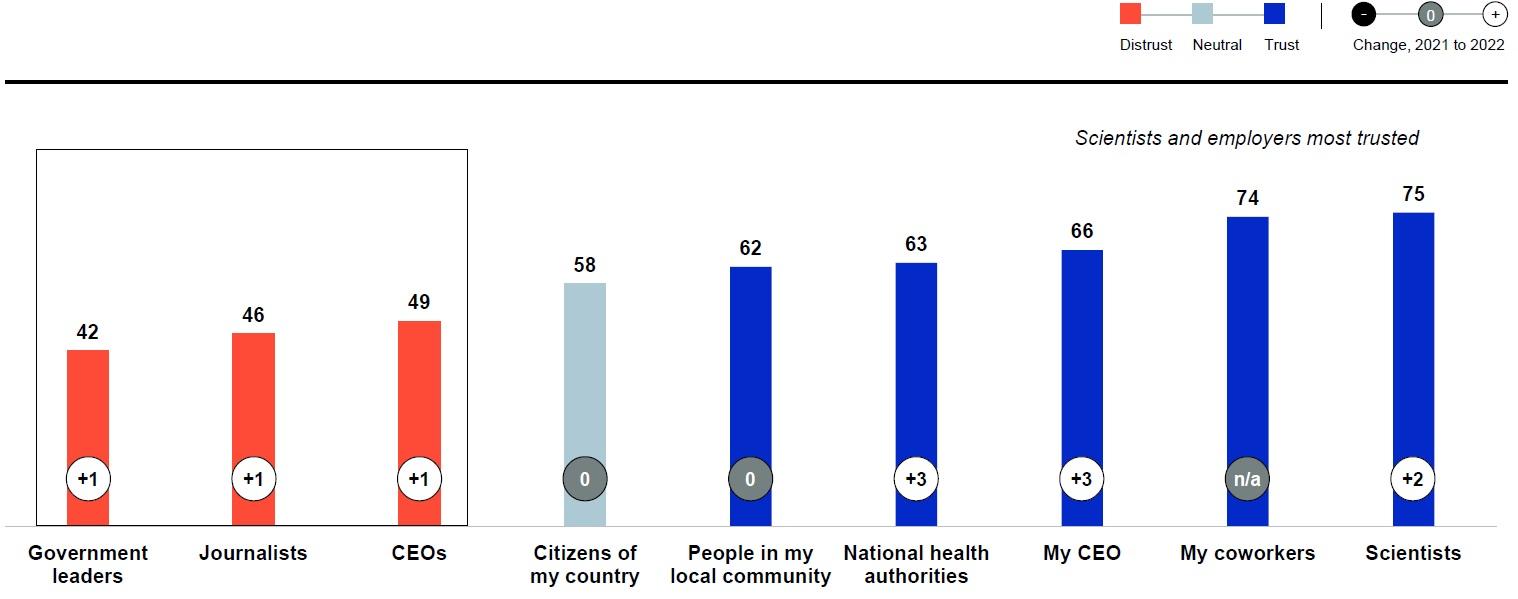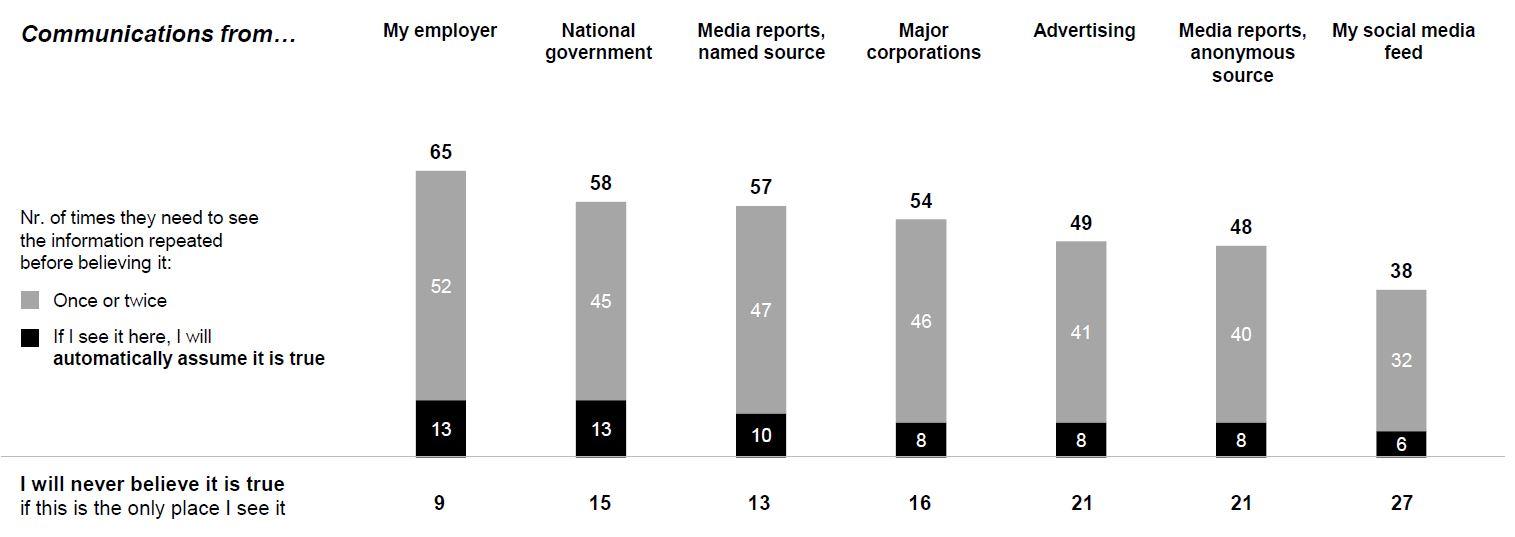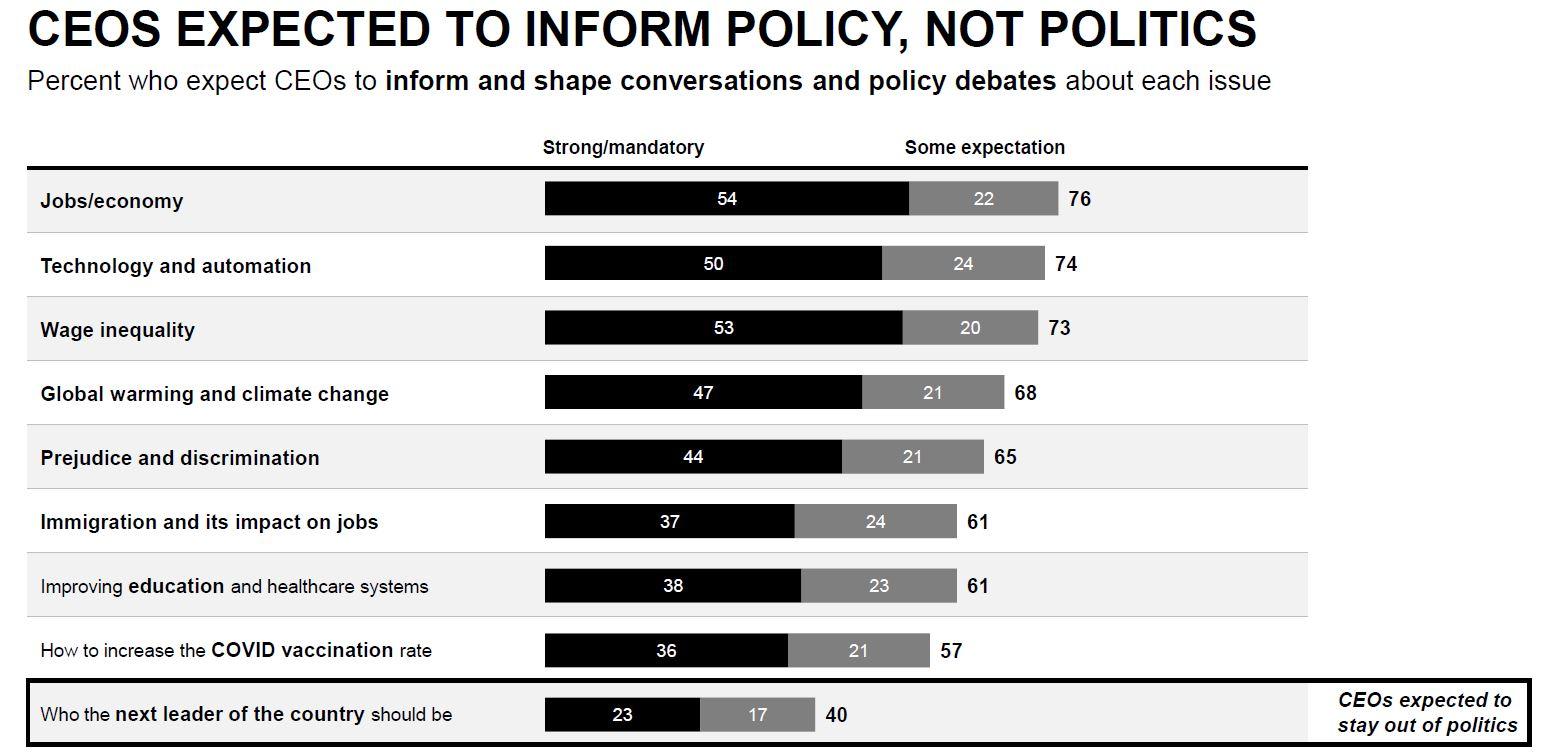



Trust in media and govt leaders dip further, CEOs still expected to be face of change
share on
Consumers distrust government leaders (42%), journalists (46%), and CEOs (49%). According to the 2022 Edelman Trust Barometer report which surveyed more than 36k respondents from 28 countries including Singapore, Malaysia, and Indonesia, respondents had high trust in scientists (75%) and their coworkers (74%) instead.
In fact, 67% of respondents were convinced that journalists and reporters are intentionally trying to mislead people by saying things they know are false or gross exaggerations. This was an 8% increase from the previous year. Respondents also had the same sentiment about government leaders (66%) and business leaders (63%), with this worry growing 9% and 7% respectively.

Meanwhile, compared to 2012, trust in traditional media dipped 5% to 57% this year and was the least trusting source for respondents in Russia (35%), Japan (39%), as well as South Korea and the US (43%). Despite the dip, trust in traditional media remained neutral among respondents. Instead, respondents were found to distrust owned media and this sentiment increased 1% to 43% this year. There was also distrust in social media (37%).
Fake news concerns are also at an all time high now, rising 4% to 76%. Respondents from Indonesia (83%), Malaysia (83%), Thailand (82%), and Singapore (75%), for example, were worried about fake news being used as a weapon.

Meanwhile, on the government front, respondents did not think it would be able to take on a leadership role to coordinate cross-institutional efforts to solve societal problems. There was also no faith in the government successfully executing plans and strategies that yield results.
Edelman also found that societal leadership is now a core business function. According to the report, all stakeholders need to hold businesses accountable and consumers still very much focus on what aligns with their beliefs and values. More than half (58%) are willing to do so by purchasing from or advocating for brands based on their beliefs and values. At the same time, 60% will choose a place to work based on their beliefs and values while 64% will invest based on similar benchmarks.
Overall, businesses remain the most trusted institution (61%) while trust has once again declined for government (52%) and the media (50%), each dipping by 1%. According to respondents, these two institutions are seen by respondents to be more of a dividing force in society. Meanwhile, trust in NGOs jumped 2% to 59%. Respondents in Indonesia were highly trusting of their employers (91%) while this sentiment was also relatively high in Malaysia (79%) and Singapore (75%).
Also, 65% said they will believe information from their employers automatically or after seeing it twice, compared to 58% and 57% who said the same for national government and media reports respectively.

Once again, CEOs are expected to be the face of change, with 81% saying they should be personally visible when discussing public policy with external stakeholders or work their company has done to benefit society. Meanwhile, 60% also expect the CEO to speak publicly about controversial social and political issues they care about when considering a job. This sentiment, in particular, saw a 5% increase compared to 2019.
Additionally, CEOs are expected to inform and shape conversations and policy debates around jobs and economy, followed by tech and automation, as well as wage inequality, and global warming and climate change. On the other hand, they are expected to stay out of politics

The cycle of distrust
According to Edelman, government and media fuel a cycle of distrust which threatens societal stability. The government and media feed a cycle of division and disinformation for votes and clicks while NGOs and businesses are pressured to take on societal problems beyond their abilities.
To break this cycle, Edelman said NGOs and businesses must act as stabilising forces. Respondents also expect more business engagement on societal issues. For example, 52% think businesses are not doing enough to address climate change, while 40% and 37% feel the same way about economic inequality and workforce reskilling.
In fact, businesses and NGOs are seen as competent and effective drivers of positive change compared to government and media. Nonetheless, information quality is still the most powerful trust builder across institutions.
When it comes to restoring trust, Edelman said society needs to recognise that the business societal role is here to stay and that people want more business leadership, not less. Institutions also need to restore belief in society's ability to build a better future and show that the system works. In a world that is becoming increasingly divisive, it is important for leadership to focus on solutions over divisiveness and long-term thinking over short-term gain. At the same time, every institution must provide clear, consistent, fact-based information to break the cycle of distrust.
Photo courtesy: 123RF
Related articles:
Edelman to 'part ways' with clients that do not meet new climate standards
Richard Edelman: 'Don't surrender to the ad agencies. We fight'
Study: Business CEOs need to step up in 2021 as trust in government and traditional media plummets
share on
Free newsletter
Get the daily lowdown on Asia's top marketing stories.
We break down the big and messy topics of the day so you're updated on the most important developments in Asia's marketing development – for free.
subscribe now open in new window
